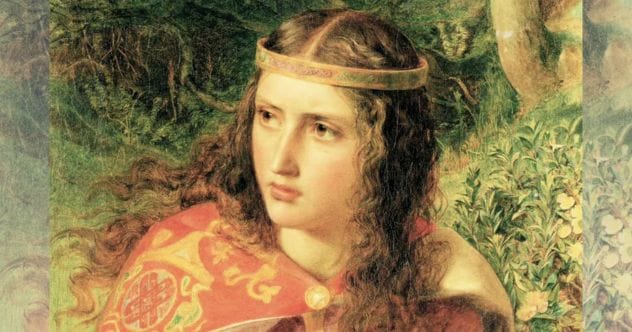Eleanor of Aquitaine stands as a towering figure in medieval European history. Born in 1122, as the daughter of William X, Duke of Aquitaine, she rose to become queen consort of both France and England. Renowned for her extraordinary intelligence, beauty, and unwavering determination, Eleanor defied the conventions of her time, leaving an indelible mark that resonates even today.
Eleanor’s primary influence stemmed from her roles as queen and mother. Her marriage to King Louis VII of France in 1137, followed by her union with King Henry II of England in 1152 after the annulment of her first marriage, reshaped the political landscape of Western Europe. These alliances wove a complex tapestry of relationships and conflicts that defined the era.
Beyond her marriages, Eleanor championed the arts and played a pivotal role in shaping courtly love and troubadour culture. She adeptly managed her husband’s extensive domains and wielded considerable diplomatic skill. Today, her enduring legacy symbolizes the power and independence of women in the Middle Ages. Let’s explore ten unexpected ways Eleanor of Aquitaine pioneered her world!
Related: 10 Best Kings Followed By Terrible Sons
10 Trailblazing Queen of Two Kingdoms
Eleanor of Aquitaine shattered norms as queen by wedding King Louis VII of France and later King Henry II of England, an unprecedented feat. Her journey from Queen of France to Queen of England showcased her diplomatic prowess and pioneering spirit, defying expectations with each decisive step.
Her marriage to King Louis VII of France in 1137 marked her entry into royalty. She quickly learned the complexities of the French court. Following the annulment of their marriage, rather than fading into obscurity as many women did during the era, Eleanor forged ahead.
Her pioneering moment arrived with her marriage to Henry II of England in 1152, which crowned her Queen of England. This transition positioned her as a key player in medieval European geopolitics, adeptly navigating alliances and conflicts with unparalleled skill.[1]
9 Patron of Romantic Love and Poetry
Eleanor championed courtly love and poetry, fostering medieval literature and chivalry. Her support for poets and troubadours in France and England sparked a cultural movement. She inspired poetic celebrations of romantic love and chivalric ideals, setting a precedent for generations to come.
Breaking from tradition, Eleanor’s public endorsement of written art and romantic love was revolutionary. The troubadour culture thrived under her patronage in the 12th century. Surrounding herself with poets like Bernart de Ventadorn and André de Coutances, who composed verses in her honor, she fueled interest in courtly love and poetry.
Her influence extended to her daughters, who also became patrons of courtly love and literature. Eleanor’s legacy in fostering a cultural movement that celebrated romance, honor, and chivalry remains a cornerstone of her historical significance.[2]
8 Advocate for Women’s Rights
Eleanor championed women’s autonomy, challenging societal norms by asserting their right to a voice in marriage and inheritance. Her stance challenged the status quo of the 12th century.
As Queen of France, Eleanor challenged the validity of her marriage to Louis VII, demonstrating her early commitment to women’s independence. Her actions were bold and controversial.
Later, as Queen of England, she remained an active advocate for women’s rights. Her involvement in managing vast lands and properties secured her daughters’ inheritance and independence, marking a significant departure from traditional norms.
Eleanor’s advocacy left a mark on discussions surrounding gender equality in the medieval world. Having a woman in power stand up for women was a significant shift in Middle Ages values.[3]
7 Founder of the Court of Love
Eleanor’s establishment of the Court of Love in the 12th century allowed women to address grievances related to love and marriage, offering a platform to voice concerns and seek justice.
The Court of Love, presided over by Eleanor, consisted of noblewomen who adjudicated disputes related to relationships. This initiative gave women a voice in relationship matters, fostering a code of conduct and etiquette in courtly love.
The Court of Love contributed to the evolving concept of chivalry. It helped shape the ideals of romance and courtly behavior prominent in medieval literature, pushing forth the idea of love as a noble pursuit.[4]
6 Cross-Cultural Queen
Eleanor’s exposure to diverse cultures broadened her horizons, making her a pioneer in embracing different customs. Her extensive travels across Europe and the Middle East shaped her cosmopolitan worldview. Few traveled as far as Eleanor did during her lifetime.
Traveling to the Middle East prompted her to reconsider Christianity’s practice and spread it through soft power. Her early years in Aquitaine exposed her to a blend of influences. Her travels to the Holy Land also brought her into contact with various cultures that impacted her perception of the world.
Eleanor introduced novel ideas to the courts of France and England. Her persuasive powers convinced leaders to back her, solidifying her influence.[5]
5 Powerful Regent
Eleanor ruled effectively in a male-dominated world, showcasing her political acumen and leadership. As regent for her son Richard the Lionheart, she managed kingdom affairs with strength during his participation in the Third Crusade.
Her ability to maintain stability demonstrated her strength as a ruler, unlike any woman before her. Eleanor also acted as regent for her other sons, including King John and Geoffrey.
Her achievements in governing solidified her reputation as a pioneering female ruler. Her regency was unique and impactful, conducted with guile.[6]
4 Participation in the Second Crusade
Eleanor joined the Second Crusade, becoming one of the few royal women to actively participate in a military campaign. Her presence alongside her husband, King Louis VII, demonstrated her commitment to the Christian cause.
Eleanor accompanied her husband and played a role in the campaign. Her active involvement in military affairs was groundbreaking for a queen in the 12th century. She led 300 women dressed as Amazons and a thousand knights into battle. She was unlike most women of her time.
3 Architectural Legacy
Eleanor influenced the construction of castles like those at Poitiers and Chinon, leaving a mark on medieval fortifications. Her architectural projects were not just aesthetic; they had strategic implications.
Her designs had military implications. Those architectural endeavors helped fortify the territories she ruled. Her approach to castle design included defensive features, contributing to the evolution of medieval architecture.
The medieval castles we think of today were inspired by Eleanor’s ideas. Her architectural designs inspired castle designs for centuries.[8]
2 Mother of Notable Rulers
Eleanor’s descendants became notable rulers of the 12th and 13th centuries, including Richard the Lionheart and John Lackland. Her role as the mother of these figures underscores her pioneering role in shaping medieval Europe.
Eleanor’s ability to serve as regent linked her to critical moments in European history.
Richard the Lionheart was known for his leadership during the Third Crusade. John Lackland became King of England, with his reign marked by the sealing of the Magna Carta.[9]
1 Enduring Legacy in History and Literature
Eleanor’s life has inspired books, movies, and historical accounts. Her legacy as a queen, diplomat, and advocate for women’s rights captivates historians and enthusiasts. She remains a prominent figure in historical narratives.
Historians debate her legacy. Her extraordinary life has been the subject of numerous biographies and novels. Eleanor’s influence on medieval Europe will not be forgotten.[10]
Eleanor of Aquitaine’s life was truly groundbreaking. From her role as a powerful queen to her advocacy for women’s rights and her influence on the arts, she left an indelible mark on history. Her legacy continues to inspire and captivate, reminding us of the extraordinary potential within each of us to challenge norms and shape the world around us.
What aspect of Eleanor of Aquitaine’s life do you find most inspiring? Leave your comment below!










